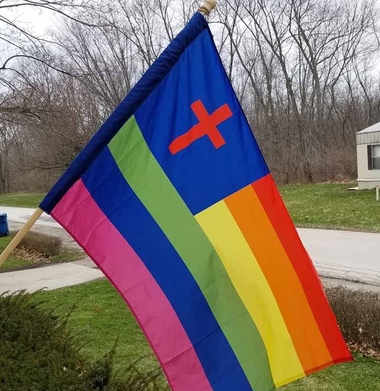United Methodist Church faces split after vote on LGBTQ clergy, same-sex marriage

The United Methodist Church (UMC) has for years debated whether to ordain LGBTQ clergy, and to allow churches to perform same-sex marriages. In 2016, delegates at the Methodist General Conference narrowly voted to delay all consideration of LGBTQ related proposals.
Instead, they formed a commission to review church policy on the issues and develop a plan to address differences in the UMC. Delegates for across the UMC, including churches in other countries, met this week in St. Louis to consider plans.
Today at the meeting, delegates voted narrowly to continue the UMC’s traditional stand against LGBTQ clergy and same-sex marriage. The vote was 449 to 374, close to an earlier vote Monday that reached the same conclusion.
The decision risks a major split in the denomination.
Related: Methodists trying to avoid church split over gay rights
Progressive UMC churches have long embraced diversity, including acceptance of LGBTQ people. Conservatives in the church have not, leading to church trials in some districts of clergy who performed same-sex weddings. The trials often ruled against the clergy members and “defrocked” them.
As delegates gathered in St. Louis, two plans were being considered. One, called the One Church Plan (OCP), would leave allowing ordination of LGBTQ clergy and approval of same-sex marriage up to regional bodies. It would remove language from the church’s Book of Discipline that asserts “the practice of homosexuality is incompatible with Christian teaching.”
The OCP would also have allowed churches that don’t agree with the changes to leave the denomination along with their property and assets.
The Traditional Plan, backed by church conservatives, keeps the LGBTQ bans in place and advocates for more strict enforcement of them.
On Monday, delegates meeting as a “committee of the whole”, rejected the One Church Plan after it gained the support of only 47 percent. The meeting then endorsed the Traditional Plan, with more than 56 percent of the more than 800 delegates.
Progressive Methodists reacted on their Facebook page (Progressive Methodists) to the news, talking about their sadness and looking for paths forward.
Christy Thomas wrote, “The One Church Plan is now officially dead. In nearly an identical vote to yesterday, delegates refused to consider it and will stay with the constitutionally impaired and exceedingly punitive Traditional Plan. We are now, in the eyes of the world, a 'no gays allowed' church. I weep.”
Another wrote, “This is a sad day in Methodist history.”
Sarah Louie, looking for a way forward, posted, “Maybe a dumb question. What happens if the Traditional Plan passes? Do progressives leave the church? I know the other side has an exit strategy do we have a plan to stay and fight? Watching this is so upsetting.”
The traditionalists did have an exit plan if the OCP proposal had passed.
Jim Reidy said, “I predict many will ignore the ‘revised’ rules and do what they would have done if the ‘One Church Plan’ would have passed.”
The Rev. Ricky Harrison, associate pastor of First United Methodist Church in Decatur, Texas, and a young adult observer in St. Louis, described the General Conference’s direction as “frustrating and demoralizing.”
Adoption of either plan risked a split in the UMC. Under the Traditional Plan, LGBTQ affirming churches may feel forced to leave the denomination. If the delegates had adopted the OCP, conservatives had threatened to take their churches out of the denomination.
Progressives asserted that a majority of delegates from the United States support the OCP. US conservative churches teamed up with international delegates to support maintaining the LGBTQ ban.
Progressives also assert that the church’s top court is likely to rule that the Traditional Plan is unconstitutional; OCP supporters hope that is the case.
The United Methodist Church is the second largest protestant denomination in the United States, smaller only than the Southern Baptist Convention. Southern Baptists have long been staunch opponents of LGBTQ rights and same-sex marriage.
Other denominations have struggled with the issues of LGBTQ clergy and same-sex marriage and come to different conclusions. The Episcopal Church in the US defied the Anglican Communion and embraced LGBTQ people and clergy. The Presbyterian Church in America did the same. The United Church of Christ ordained its first openly LGBTQ clergy member in 1976 and has long embraced LGBTQ people and rights, with far more than 1,000 individual churches electing to become “open and affirming” of the queer community.
Copyright The Gayly – February 26, 2019 @ 12:45 p.m. CST.





